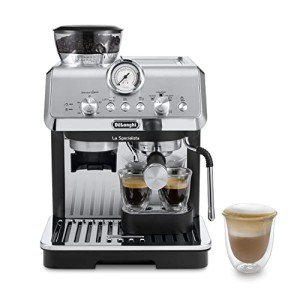The World of High-Quality Espresso Machines: A Comprehensive Guide
Espresso has actually ended up being a cherished drink among coffee lovers worldwide, known for its rich taste, intense aroma, and flexibility. The heart of a fantastic espresso lies in the machine utilized to brew it. High-quality espresso machines are developed to deliver the best shot, making them an important investment for coffee fans. This post checks out different types of high-quality espresso machines, their functions, upkeep suggestions, and answers to regularly asked concerns.
Kinds Of High-Quality Espresso Machines
High-quality espresso machines fall under a number of classifications, catering to various choices, ability levels, and budgets. The primary types include:
| Type of Machine | Description | Perfect User |
|---|---|---|
| Manual Espresso Machines | Requires user skill to control extraction and pressure. Offers the most control over the developing process. | Experienced baristas and enthusiasts |
| Semi-Automatic Machines | Combines manual operation with automation. Users control the grind and tamping, while the machine manages water dispersion. | Intermediate users |
| Automatic Espresso Machines | Automate the developing procedure, enabling programmable developing times and temperature levels. | Casual coffee drinkers |
| Super-Automatic Machines | Have integrated mills and are fully automated, dealing with everything from grinding to developing and steaming. | Users looking for convenience |
| Commercial Espresso Machines | Created for high volume use in coffee shops and dining establishments, offering sturdiness and speed. | Entrepreneur |
Comprehensive Overview of Each Type
Manual Espresso Machines
- Pros: Complete control over the developing process; can produce extraordinary quality espresso.
- Cons: Requires substantial skill; time-consuming.
Semi-Automatic Machines
- Pros: Balanced control, mixing manual and automatic procedures; exceptional quality espresso is still possible.
- Cons: Requires some understanding and experience to master.
Automatic Espresso Machines
- Pros: User-friendly; minimizes the learning curve while still producing high-quality espresso.
- Cons: Still requires some understanding of coffee-making fundamentals.
Super-Automatic Machines
- Pros: Maximal benefit; little skill required; ideal for individuals or households who want coffee without difficulty.
- Cons: Higher rate point; may lack the fine-tuning capabilities of manual machines.
Commercial Espresso Machines
- Pros: Built for durability and efficiency; frequently includes features for high-volume turns.
- Cons: Expensive; may be overkill for home use.
Secret Features to Consider
When trying to find a high-quality espresso machine, several essential functions should be taken into account:
- Pressure and Pump Type: Look for machines with a minimum of 9 bars of pressure, which is necessary for drawing out the very best flavor from coffee beans.
- Boiler Type: Single, double, and heat exchanger boilers each impact how the machine performs and the speed of brewing.
- Construct Quality: High-quality products such as stainless steel are more suitable for toughness and looks.
- Ease of Use and Cleaning: Some machines require extensive cleaning, while others are developed for simple maintenance.
- Temperature Control: Consistent temperature level is vital; consider machines with PID controllers for precise control.
Advantages of High-Quality Espresso Machines
Buying a high-quality espresso machine offers a wide range of benefits:
- Superior Quality: High-end machines permit higher control, leading to tastier espresso.
- Toughness: Built to last, quality machines require less repair work and replacements.
- Customization: Users can delight in a tailored experience by changing grind size, shot timing, and other settings.
- Increased Convenience: Automatic and super-automatic choices enable enthusiasts to enjoy espresso with minimal effort.
Upkeep and Care for High-Quality Espresso Machines
To keep an espresso machine functioning efficiently, regular upkeep is vital. Here are suggestions for keeping a high-quality espresso machine:
Descale Regularly:
- Use a descaling solution every couple of months to prevent accumulation of minerals from water, which can impact taste and performance.
Clean the Brew Group:
- For machines with a removable brew group, clean it regularly to ensure a clean extraction.
Replace Water Filters:
- Use a water filter and alter it as required to minimize pollutants in your developing water.
Daily Cleanings:
- Rinse the portafilter and group head after each use to prevent oil buildup.
Watch on the Parts:
- Monitor seals, gaskets, and other parts for wear and tear and change them as necessary.
Often Asked Questions (FAQs)
1. What is the best espresso machine for novices?
For novices, a semi-automatic machine often provides a good balance of functionality and control, allowing users to learn the skills necessary for making great espresso.
2. Are super-automatic machines worth the financial investment?
Yes, for those who focus on benefit and ease over control, super-automatic machines can be a deserving financial investment, specifically for families or busy professionals.
3. How Cappuccino Machines should I expect to invest in a high-quality espresso machine?
High-quality espresso machines range significantly in rate, with manual machines beginning at a few hundred dollars, while super-automatic or commercial machines can surpass numerous thousand.
4. Can I make other coffee beverages with an espresso machine?
Yes, many espresso machines have steam wands or attachments that enable users to develop lattes, cappuccinos, and more.
5. For how long do espresso machines usually last?
With proper upkeep, high-quality espresso machines can last over a decade, making them a long-term investment in your coffee pleasure.
High-quality espresso machines yield a transformative coffee experience, whether enjoyed at home or in a commercial setting. By understanding the types available, their features, and the upkeep needed to keep them running effectively, customers can make educated decisions that raise their coffee-drinking experience.

